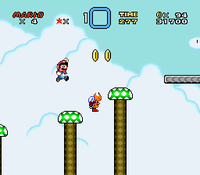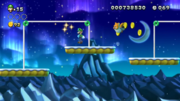Scale Lift
| It has been suggested that this page be split into Scale Lift, Piston Lift. (discuss) |
- This article is about the scale-like platforms. For lifts in general, see Lift.
Template:Item-infobox Scale Lifts[1], also called Balance Lifts[2] and Scale Platforms[3], are platforms present in the Super Mario series. When a player lands on one platform, the parallel one rises. If the player lingers too long on one platform, the scale breaks apart.
History
Super Mario series
Super Mario Bros. / Super Mario Bros.: The Lost Levels
Balance Lifts make their first appearance in Super Mario Bros., where they are the main gimmick of World 3-3, World 4-3 and World 6-3. The player is given 1,000 points if they break the lifts. They return in Super Mario Bros.: The Lost Levels, where they are more prevalent, being found in eight of the thirteen worlds. This time, they are made of mushrooms instead of metal. However, in the Super Mario All-Stars remake, both games feature them in their metallic form.
Super Mario World
While Balance Lifts themselves do not make an appearance in Super Mario World, similar platforms named Piston Lifts[4] appear. As other scales, landing on one part of the scale causes the other to rise, though the Piston Lift does not break. They appear in Butter Bridge 1.
Super Mario Advance 4: Super Mario Bros. 3
Super Mario Bros.-styled Balance Lifts appear in Super Mario Advance 4: Super Mario Bros. 3, in the World-e level Caped Escape.
New Super Mario Bros.
Balance Lifts reappear in New Super Mario Bros. in World 1-5 and World 3-2. They behave the same way as the Lifts do in Super Mario Bros.
New Super Mario Bros. Wii
Balance Lifts reappear in New Super Mario Bros. Wii, where they are the main gimmick of World 6-4. Unlike the lifts in Super Mario Bros., enemies and other items affect the scales with the player.
New Super Mario Bros. 2
Balance Lifts reappear in New Super Mario Bros. 2, in World 4-4 and Template:World-link. Unlike the Lifts in New Super Mario Bros. Wii, these Lifts reappear after breaking.
New Super Mario Bros. U / New Super Luigi U / New Super Mario Bros. U Deluxe
Scale Platforms appear in New Super Mario Bros. U, New Super Luigi U, and their remake. They are common objects in Above the Cheep Cheep Seas and Scaling the Mountainside in the former, and also appear in Weighty Waddlewings in the latter. They work as they did in New Super Mario Bros. 2.
Super Smash Bros. series
Scale Lifts also appear as stage elements in the Super Smash Bros. series; they react to fighters' weights and drop or rise at appropriate speeds. They also reappear after breaking. One appears in the Mushroom Kingdom stage of Super Smash Bros. and another appears in the Mushroom Kingdom stage of Super Smash Bros. Melee. Another appears in Super Smash Bros. for Nintendo 3DS, as part of the Golden Plains stage, though it is only available if the stage has scrolled to the right side. Scale Lifts reappear in Super Smash Bros. Ultimate in Golden Plains and the original Mushroom Kingdom stage, where they act the same as they did in previous games.
Names in other languages
| Language | Name | Meaning | Notes |
|---|---|---|---|
| Chinese | 天秤[?] Tiānchèng |
Scales | |
| Italian | Piattaforma a bilancia[7] Piattaforma bilancia[8] Ascensore bilancia[9] Fungo bilancia[10] (SMW variant) |
Scale Lift Scale Mushroom |
|
| Korean | 저울리프트[?] Jeoullipeuteu |
Balance Lift | |
| Russian | Лифт-качели[?] Lift-kacheli |
Swing/seesaw lift |
References
- ^ Super Smash Bros. Ultimate PRIMA Official Game Guide, page 454.
- ^ Hiroo Tochikubo, How to Win at Super Mario Bros., Tokuma Shoten, 1987, ISBN 4-19-720003-XC. Page 47.
- ^ Stratton, Steve. New Super Mario Bros. U PRIMA Official Game Guide. Page 107.
- ^ Mario Mania, pages 98 and 99.
- ^ Shogakukan. 2015. Super Mario Bros. Hyakka: Nintendo Kōshiki Guidebook, pages 21, 29, 119, 150, 200, 216.
- ^ Shogakukan. 2015. Super Mario Bros. Hyakka: Nintendo Kōshiki Guidebook, Super Mario World section, page 61.
- ^ Super Mario Bros. Enciclopedia; pag. 21
- ^ Super Mario Bros. Enciclopedia; pagg. 29, 119, 151, 200,
- ^ Super Mario Bros. Enciclopedia; pag. 216
- ^ Super Mario Bros. Enciclopedia; pag. 61

